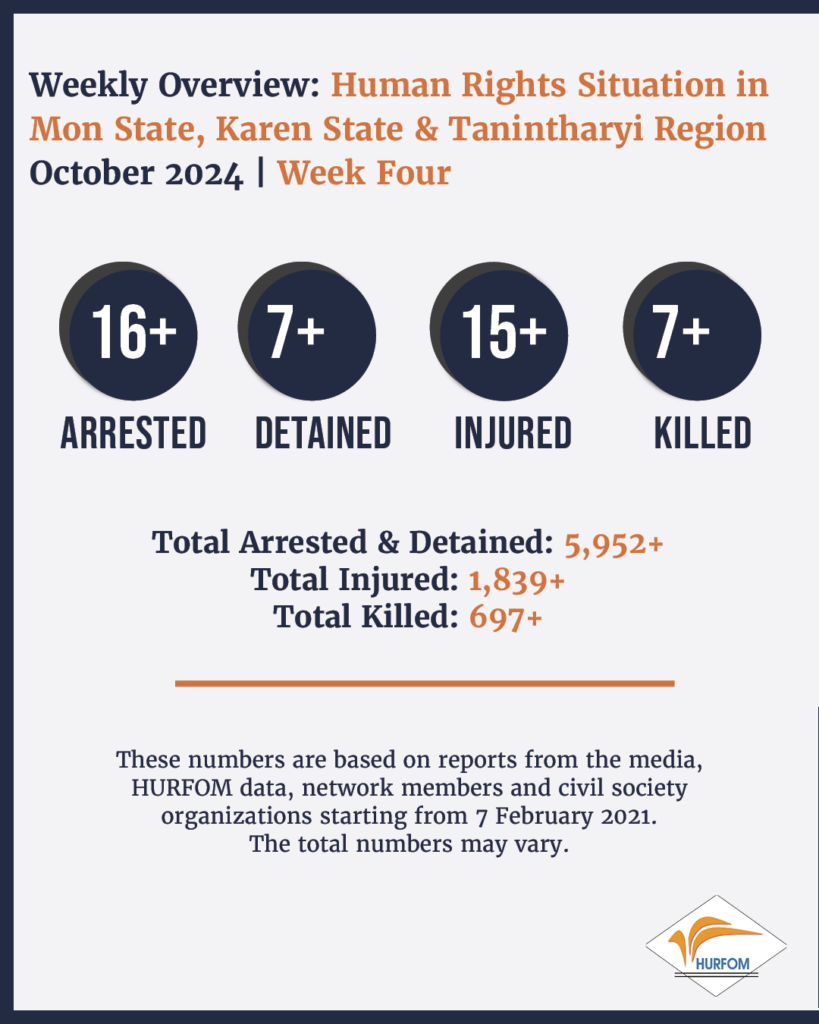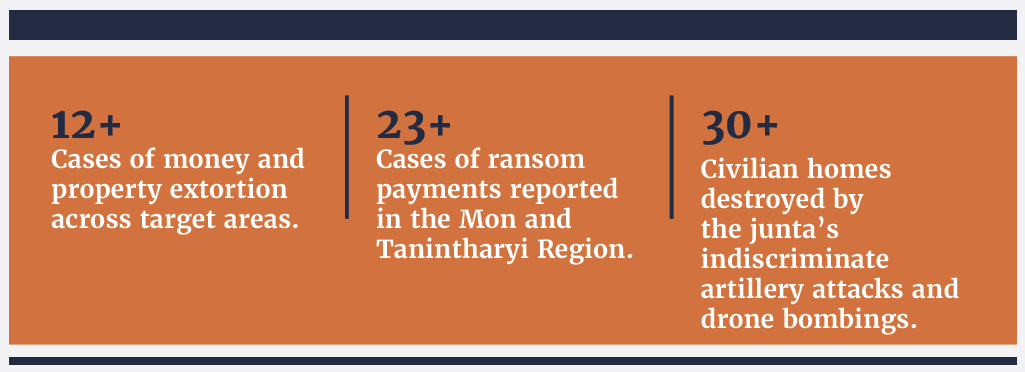Weekly Analysis: Military Junta Ramps Up Conscription Efforts in Southeastern Burma
October 28, 2024
Nearly four years have passed since the attempted coup. During that time, the military has exerted widespread force and violence against innocent civilians. In response, many pro-democracy forces have been established to challenge the regime’s unjust quest for power. There have been significant losses in territory and bases that the junta once claimed, in addition to record levels of military defections. In response, they mandated the implementation of the People’s Service Law to conscript young men and women to fight against democracy.
Across targeted areas of the Human Rights Foundation of Monland (HURFOM) in Mon State, Karen State, and the Tanintharyi region, families are feeling the devastating impacts of losing their sons and daughters to a war that is fought against their own interests. The junta has ramped up its conscription efforts in Mon State, initiating the sixth batch of military training by targeting young individuals across the region. This latest round of recruitment has seen an increase in financial incentives, suggesting a shift from traditional recruitment methods. Instead of relying solely on defense funds, the junta appears to be pressuring business owners across various townships in Mon State to contribute to funding military conscription efforts.
However, the recruitment process has not been straightforward. Rather than openly soliciting funds, the junta has been offering families payments of up to 500,000 kyats to send their young members, particularly those from impoverished backgrounds or migrant families seeking work in Mon State, to central training facilities. Reports indicate that around 150 recruits have already been gathered for this sixth batch. Additionally, other methods include targeting young people detained at the border who are subsequently coerced into joining the military—a practice that seems prevalent in border towns.
A notable aspect of this conscription drive is the declining effectiveness of previous recruitment strategies, such as lottery-based selections and mandatory quotas. The junta has resorted to door-to-door campaigns. Village administrators have been tasked with identifying eligible recruits using household registration records, resulting in many local youths fleeing their hometowns to avoid being conscripted.
The sixth batch primarily consists of recruits from disadvantaged backgrounds, including local youths and migrant families seeking economic opportunities in the area. In some cases, individuals over 40 or 50 years of age have joined out of financial desperation. A disturbing trend has also emerged where young people arrested for drug-related offences are coerced into military service as a means of avoiding prosecution. Similar to previous batches, some individuals have been hired as paid substitutes. For example, over ten villagers from Selaw in Chaungzon Township were recruited under such arrangements. However, their current safety and well-being remain unclear.
After completing military training, nearly all conscripts are deployed to the front lines. Due to high casualty rates and internal defections, the junta is urgently seeking to replenish its forces. Despite the increased efforts, local communities have shown little interest in the conscription campaigns, driven primarily by fear that their young family members might be forcibly enlisted, leading to a surge in relocations.
The conscription program reflects the junta’s struggles to maintain its internal military structure amid high desertion rates and low morale. Reports indicate that oppressive practices within the military, such as harsh discipline, forced labour, and the use of recruits as human shields on the frontlines, discourage many from joining. As a result, those conscripted often fail to return from the frontlines, creating a cycle of fear and avoidance among potential recruits.
The junta’s recent tactics involve using funds to attract recruits, often sourced from public finances, raising concerns about misappropriation. Additionally, the junta is forming “People’s Security” units, creating local militias that blend into communities, giving the appearance of civilian groups while imposing control and suppressing dissent. By positioning these units in villages, they intend to extend their influence and power, further blurring the lines between military and civilian governance.
Overall, the intensified conscription efforts reveal a regime under strain. The regime seeks to maintain its military dominance while facing growing resistance and widespread disapproval from local communities.
Overview of Main Cases
Two Men Abducted by the Junta Found Dead In Long Lone Township, located in the southern part of Dawei District, two young men were found dead after being captured and killed by junta troops. The bodies were found in a forested area near a football field. The men were believed to have been abducted in a military raid.
Local Workers Extorted by the Junta Since October 5th, plantation owners and workers from eight villages in the Kan Bauk region, Yebyu Township, Tenasserim Division, have been extorted for up to 20,000 MMK for a required recommendation letter issued from the Mawrawaddy Navy Command and from particular Administrators.
Junta Military Operation Leads to Deaths and Arrests of Civilians On October 10th, the military began a multi-day operation in Long Lone Township, Tenasserim Division. By October 16, the regiment had killed three villagers. Then, two other villagers were killed on October 21st. The junta also arrested eight local people.
Political Prisoner Dies in Military Custody On October 17th, an elderly political prisoner who was serving his prison term in Dawei Prison, Tenasserim Division, died.
Local Youths Shot At, Arrested by the Junta
Three youths were shot at and arrested by junta forces after setting off firecrackers during the Thadingyut festival in Nan Khe Ward, Thaton Township, Mon State. The incident occurred on the night of October 19, when joint forces of the junta approached the youths.
Villagers Killed and Injured During Clashes in the Tanintharyi Region
Three villagers were killed, and eight others were injured, while over 5,000 locals have been forced to flee amid ongoing clashes in Long Lone Township, Dawei District, Tanintharyi. The military junta launched offensives on October 12, targeting villages and injuring civilians.






















































